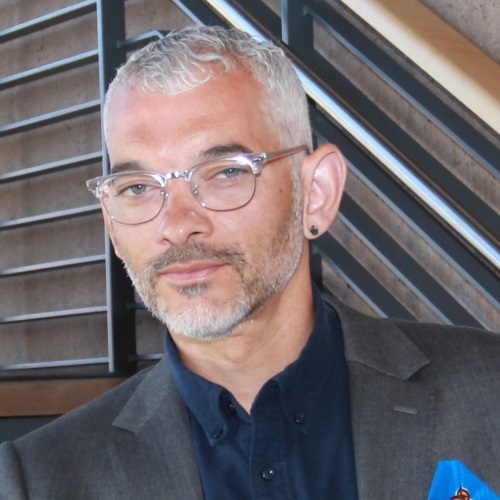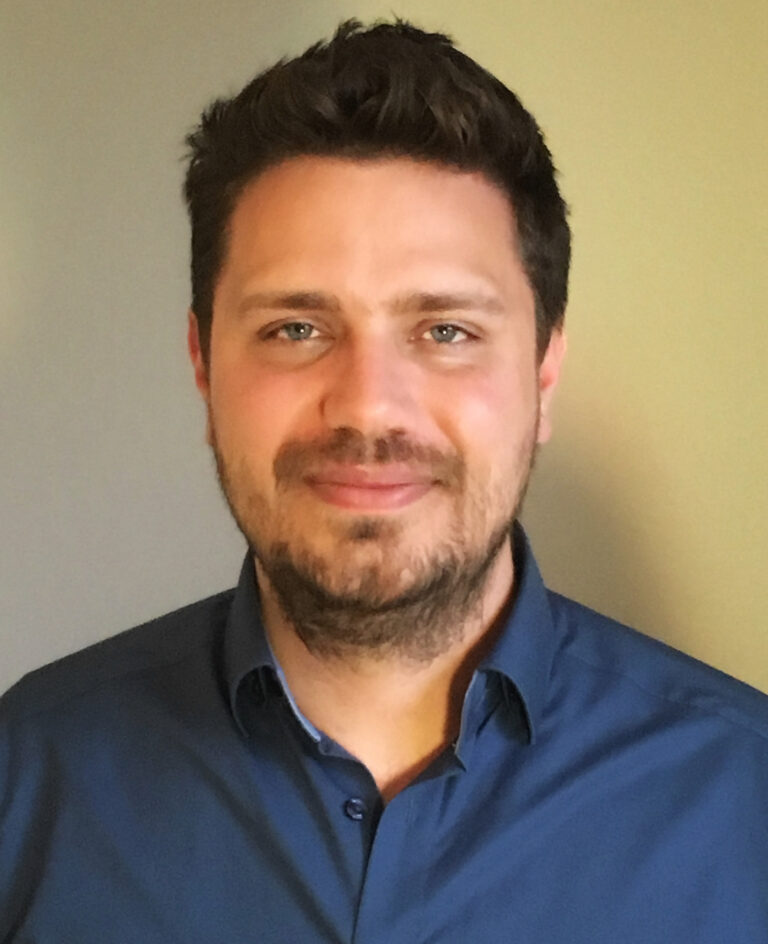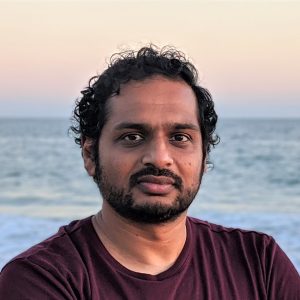Four ICS Professors Receive NSF CAREER Awards
The Donald Bren School of Information and Computer Sciences (ICS) is pleased to recognize four faculty members who recently received the prestigious National Science Foundation’s Faculty Early Career Development (CAREER) award. Join us in congratulating Stacy Branham and Roderic Crooks from the Department of Informatics, and Stephan Mandt and Sameer Singh from the Department of Computer Science.
The CAREER program supports junior faculty serving as academic role models in research and education and leading advances in their field of interest as they “build a firm foundation for a lifetime of leadership in integrating education and research.” These four ICS faculty members are leading cutting-edge research into areas spanning accessible computing, data-intensive technologies, resource-efficient machine learning and natural language processing. They are also exploring innovative ways to better engage with underrepresented communities, enhance our understanding of technology’s impact on society, and train future generations to build ethical and equitable digital systems.
“We are delighted that these early career faculty are recognized with NSF CAREER awards,” says ICS Dean Marios C. Papaefthymiou. “Their projects reflect the intellectual diversity and broad-ranging impact of the research pursued by ICS faculty.”

Accessible Computing for Independent Living
Assistant Professor of Informatics Stacy Branham received the award for her project, “Advancing Computing for Parents with Vision Impairments.” The work will provide an empirical foundation for developing technologies for people with disabilities that supports them in their everyday lives. In particular, it will identify challenges that people with vision impairments face in caring for others and will develop novel interaction models for voice assistants to facilitate parent-child bonding and learning as parents who are blind read with their young children.
“For decades, the majority of technology research and development for people with disabilities has been focused on how we can enable economic self-sufficiency through workplace accessibility, but people are more than their work,” explains Branham. “What I love about this research project is that it addresses both a research and practice gap related to technology needs of people with disabilities more holistically.”
In addition, the project aims to help produce future software developers skilled in building innovative accessible technologies. Branham and her team, which includes two students with vision impairments, will be partnering with students enrolled in the AP Computer Science course at Woodbridge High School (in Irvine) in collaboration with community partners from the Dayle McIntosh Center (DMC), the biggest independent living center for people with disabilities in California.
The research and outreach components of the proposal are distinct but complementary. “On the one hand, students in my research lab — many of whom have disabilities — will be developing accessible voice technologies with blind parents. On the other, students in mainstream classrooms — most of whom do not have disabilities — will be learning about accessible software development with blind technologists,” explains Branham. “Together, these initiatives support my lab’s vision for a future where everyday technologies are designed upfront to integrate rather than ostracize people with disabilities.”
 Data-Intensive Technology and Community Organizing
Data-Intensive Technology and Community Organizing
Assistant Professor of Informatics Roderic Crooks was recognized for his research into “Community Organizing for Datafied Worlds.” The award funding will help Crooks as he engages with working-class communities of color by collaborating with community organizers to better understand data activism and the social consequence of data-intensive technologies.
“This project begins with a simple premise,” says Crooks. “What if academics acknowledged what working-class people of color know about the data-intensive technologies already deployed in our communities?”
Building off that acknowledgement, Crooks has organized the projects into four main parts:
- research data practices of community organizers engaged with technology;
- co-design with community organizers as partners;
- construct a platform to support academic research on community organizers; and
- promote data literacy and K-12 data science education through outreach in working-class communities of color.
He stresses that every aspect of this project has been designed to be inclusive of working-class communities of color and both their ongoing, historical struggles for full citizenship in American society and their more recent struggles for equitable forms of technology. Part of the focus will be examining how organizers address the harms of data-intensive technologies deployed in their communities.
“Contemporary community organizers in working-class communities of color, like other kinds of data professionals, create, aggregate and visualize data in order to inform organizational activities and to communicate with various audiences,” he says. “Paradoxically, they also criticize — via their work — the design, development and use of data-intensive technologies in a variety of domains, including law enforcement, public education, public health and pandemic response.” Through this project, Crooks hopes to give academic researchers “tools to work with community organizers and other kinds of community-based institutions more ethically, more empathetically, more carefully.”
 Resource-Efficient Machine Learning
Resource-Efficient Machine Learning
Assistant Professor of Computer Science Stephan Mandt, through his project, “Variational Inference for Resource-Efficient Learning,” aims to address the resource inefficiencies of deep neural networks. Such inefficiencies have become a major roadblock for progress in AI.
“For example, recent models for natural language generation contain more than a hundred billion parameters,” Mandt says. “Training such models can cost enormous amounts of electric power — nearly five times the lifetime carbon dioxide emissions of a typical car.”
The innovative aspect of Mandt’s approach toward resource-efficient deep learning is using a unified set of mathematical and statistical methods: he views models and algorithms through the lens of information theory, making it possible to formally quantify and minimize the required resources. Outcomes of his project include new methods for compressing both neural networks and their data (e.g., images and video), as well as new algorithms for faster training. “Making deep learning more resource-efficient is of enormous societal relevance,” he says. “Algorithms will make better decisions with less data, making them more reliable in safety-critical areas such as autonomous driving. Also, more data can be processed with less energy and storage.”
In addition, Mandt plans to create a new machine learning track for the UCI Office of Access and Inclusion’s Summer Transition Program (OAISTP) that seeks to support the careers of historically underrepresented groups. “I will partner closely with OAI to contribute to the program through mentoring, summer teaching, and outreach activities.”
 Addressing NLP vulnerabilities
Addressing NLP vulnerabilities
Recent advances in machine learning have led to an increase in natural language processing applications, but NLP models are far from perfect. Assistant Professor of Computer Science Sameer Singh is focused on “Detecting, Understanding, and Fixing Vulnerabilities in Natural Language Processing Models.” As outlined in the project abstract, NLP models can “latch onto erroneous artifacts, do not support natural variations in language, are not robust to adversarial attacks, and only work on a few domains.”
Singh hopes to make it easier to address NLP vulnerabilities by developing several techniques in support of more robust training and evaluation pipelines. “I am working to detect what the problems in these NLP models are,” he explains, “and to find ways to understand and fix them.”
He also plans to engage with the developers of NLP models in academia and industry to develop a data science curriculum for K-12 education, particularly for students from underrepresented communities. Engaging more students and bringing in diverse perspectives will help address the growing need for research in this area.
“NLP has been used in lots of important applications such as detecting hate speech, abuse and misinformation,” says Singh. “These are applications in which mistakes by the models can result not only in a poor user experience but also bullying, abuse, and even misguiding and changing people’s views.” In the long run, Singh hopes to improve these important NLP applications by providing tools that help practitioners build models that are free of errors.
These four faculty members join a long list of ICS CAREER award recipients, including the following from more recent years: Charless Fowlkes, Alexander Ihler, James Jones, Sam Malek, Kylie Peppler, Anne Marie Piper, Ardalan Amiri Sani and Erik Sudderth.
— Shani Murray